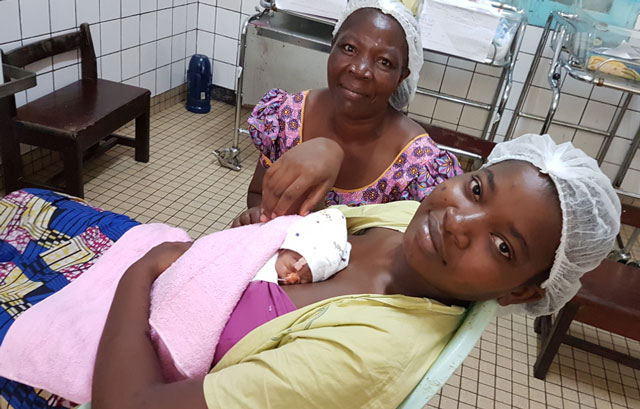
Kampala, Uganda | THE INDEPENDENT | Researchers in Uganda are conducting a trial to determine the mortality benefits and cost-effectiveness of kangaroo mother care (KMC) among ill infants weighing 2000 grams or less.
KMC is a method of care of preterm infants that involves skin-to-skin contact with the mother or another caregiver, breastfeeding, and supportive care. Many studies show that KMC reduces mortality, and infections, among babies who are already clinically stable.
The two-year OMWaNA (baby) trial will involve more than 2000 mothers and their babies at four hospitals in Uganda including Entebbe, Masaka and Jinja Regional Referral Hospitals, and Iganga District Hospital. the trial will determine if KMC for ill or unstable newborns will save more lives than current standard of care.
OMWaNA will also examine other important clinical outcomes, including breastfeeding, weight gain, and women’s well-being.
The World Health Organization (WHO) recommends KMC for the “routine care of newborns weighing less than 2000g initiated as soon as newborns are clinically stable”.
However, close to 75% of newborn deaths occur before stabilisation in settings without intensive care. Hence WHO has stated that a priority research gap is if KMC is effective and safe for newborns who are not clinically stable. KMC is promoted by the Government of Uganda and is especially important in large, busy hospitals since KMC reduces length of hospital stay.
The OMWaNA trial is a partnership of the Medical Research Council/Uganda Virus Research Institute & LSHTM Uganda Research Unit, the London School of Hygiene & Tropical Medicine (LSHTM), Makerere University, and four Ugandan government hospitals.
It is funded through the UK’s Joint Global Health Trials scheme, from MRC UK, UKAID, the Wellcome Trust, and NIHR.
Conventional newborn care is a major gap especially in low resource settings. 2.5 million newborns die worldwide each year, among which more than 80% are born small due to being preterm, small-for-gestational age, or both. Many countries, especially in Africa, and including Uganda, need to more than double their progress for newborn survival to meet the SDG 3.2 by 2030. Uganda’s newborn mortality are has not reduced significant in the last two Uganda DHS and is still 27 per 1000, and the target is 12 per 1000 by 2030.
More than 20 million LBW infants are born every year – over 96% of them in developing countries. These LBW infants are at increased risk of death and developmental delay. Major mortality reductions could be achieved by improving care of small neonates in low resource settings.
Data from the Ministry of Health shows that, each year, over 200,000 or 14% of Ugandan babies are born prematurely (<37 weeks gestational age).
The same data source reveals that complications of preterm birth are directly responsible for 31% of Uganda’s neonatal deaths, and many of the preterm babies who survive face a lifetime of disability. According to the WHO, Uganda ranks 13th out of 184 countries for the highest number of babies born prematurely and 11th for number deaths due to complications from preterm birth.
Prof. Joy Lawn, Director of the Maternal Adolescent Reproductive and Child Health (MARCH) Centre at the London School of Hygiene & Tropical Medicine and the Principle Investigator of this trial, says:
“In much of the world, Kangaroo Mother Care is only initiated 3–10 days after birth or when babies are considered to be clinically stable – by which time many deaths among preterm and low-birth weight babies have already occurred. I was born in Uganda and am delighted that Uganda will lead this important trial, and inform improved care for newborns here and all over the world”
As part of the trial, the neonatal units at the participating hospitals are being refurbished and provided with extra nursing care. The trial will also improve high quality newborn care and training for study staff as well as improve the research capacity at the four hospitals.
*******
SOURCE: MRC Uganda
 The Independent Uganda: You get the Truth we Pay the Price
The Independent Uganda: You get the Truth we Pay the Price






Thanks, useful information 🙂